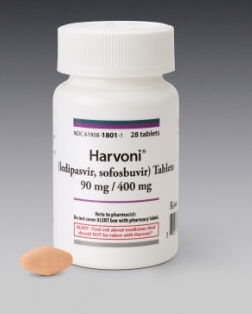
Anyone following the hepatitis C drug market knows that Express Scripts CMO Steve Miller has a strong point of view. He's been quite vocal about Gilead Sciences' ($GILD) pricing on Sovaldi, the first in a new generation of oral treatments. Now, he's turned to the Gilead follow-up to that drug, a combo med dubbed Harvoni that aims to take the place of older cocktails.
Sovaldi's price tag is $84,000. Harvoni's, which includes Sovaldi and ledipasvir, a new hep C fighter, is $94,500 for 12 weeks of treatment. Per pill, that works out to $1,000 and $1,125. Miller's latest argument? That's orphan drug-level pricing. And with 2.4 million patients to treat in the U.S., Harvoni is not an orphan drug.
Orphan drugs are designated as such because they're developed for diseases that affect relatively small numbers of people. Higher prices for these meds are sustainable, because they're only used by thousands of patients. Plus, they're justified, because drugmakers have a smaller market from which to reap any return on their R&D investments, Miller contends. That ROI spurs innovation.
"What we're seeing today in hepatitis C is orphan-drug pricing for non-orphan drugs," Miller writes in a blog post on the Express Scripts website.
To illustrate his point, Miller points to a chart ranking the cost per 30-day prescription of the most expensive drugs Express Scripts covers. At the top end, that can top $70,000--for treatments such as NovoSeven RT, a hemophilia treatment with a potential U.S. market of 5,000 patients. Some of the patient pools for these top-priced meds don't even hit triple digits. The biggest market--apart from hep C--is 50,000 patients, including one group with an enzyme deficiency treated with Elaprase ($30,000 to $35,000 per 30 days).
Harvoni ranks in the same pricing category as Elaprase. But its market is enormous, obviously, with those 2.4 million potential U.S. patients with the genotype 1 strain of hep C. Sovaldi also makes the high-priced list, with $28,000 to $30,000 per 30 day script, and the same genotype 1 market.
Of course, this is something of a false comparison, because the hep C drugs are cures for most patients after 12 weeks of therapy--and Harvoni may cure patients in 8 weeks, or in some cases, four weeks. Enzyme therapies and hemophilia clotting factors are taken for life.
Still, the hep C pricing is unprecedented, as Miller notes. "Never before have drugs been priced this high to treat such a large patient population," he says.
There's a fairness argument here. Sovaldi went from zero-to-blockbuster in a matter of months, and its sales for the year are likely to top $10 billion. Even compared with orphan drug sales, that's a heap of money. Compared with Gilead's R&D spending on Sovaldi? Let's just say the company is well on its way to recouping all of it and much more.
And then there's the now-familiar cost burden argument. "Harvoni's price ... is simply unsustainable," Miller writes. "It forces patients to decide between medications and other staples like food or rent. And it forces payers ... to consider whether or not they can even sustain the pharmacy benefit they provide to members."
Miller has called for a public debate about hep C drug pricing. So far, that hasn't really happened. On one side, payers have lamented their potential cost burdens--and developed strategies to limit their spending. On the other, Gilead has rightfully pointed out that its meds prevent very costly hep C complications down the road, which will save the system a lot of money, albeit eventually. In the middle are patients whose insurance won't cover treatment, who can't afford co-insurance--and the lucky ones who've been able to start therapy. Complaints are many. Solutions are few.
Express Scripts and its rivals are hoping that new market entrants from AbbVie ($ABBV), Merck ($MRK) and others will introduce some price competition into the game. Miller has said that he's planning to seek big discounts in return for exclusive access to the PBM's patients, but given that all the hep C drugmakers have an interest in reaping their returns, their willingness to cut deals may be limited. France has gone so far as to propose a new tax on hep C drugmakers, as a penalty for too-high prices--or incentive to lower them.
- see Miller's blog post
Special Reports: The top 10 most expensive drugs of 2013 | Top 20 orphan drugs by 2018